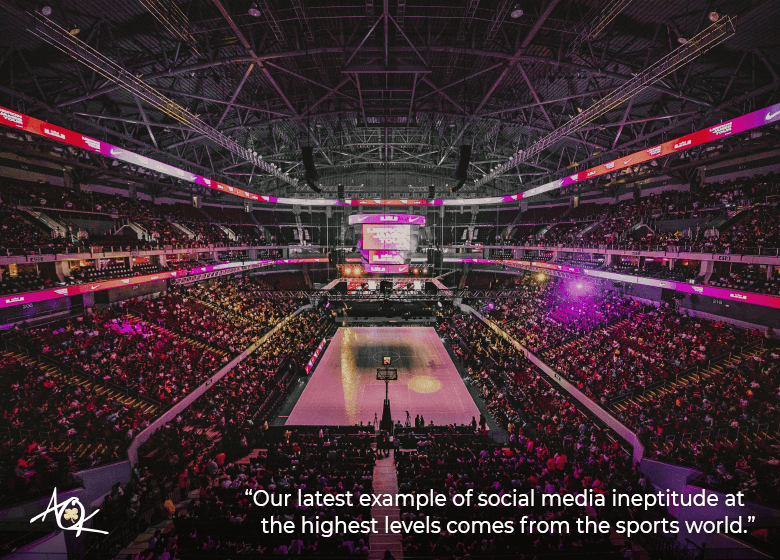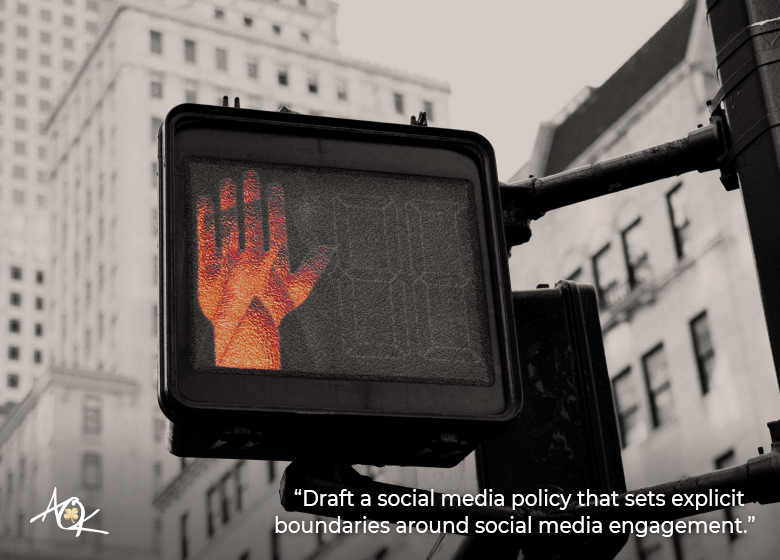Another month, another example of social media ineptitude at the highest levels. Our latest example comes from the sports world (a refreshing departure from the usual culprits in the political and entertainment realms), and it’s a bizarre one.

In recent weeks, sports website The Ringer reported that Philadelphia 76ers president and general manager (and former Toronto Raptors GM) Bryan Colangelo had been running so-called ‘burner’ or fake accounts on which he—or someone closely connected to him—is alleged to have written critical diatribes assailing player performance, defending his own sartorial choices and even discussing confidential player physical results.
It’s important to note that these were anonymous accounts are not officially associated with the team in any way, but they definitely discussed official team business. The 76ers have since brought in an independent law firm to investigate the incident. In recent days Colangelo’s wife has been cited as a possible manager of at least some of the accounts.
Whoever is the one responsible—and assuming this isn’t some elaborate hoax designed to embarrass Colangelo—this all reflects poorly on the team. It’s one thing to have an employee making controversial statements on social media, but something entirely different when a top executive is allegedly rippling his own people and other league top guns while hiding behind a fake internet identity.
The damage to the 76ers brand, not to mention inter-team relations, could be significant if it’s discovered that Colangelo or one of his associates is to blame. And let’s not kid ourselves, as legal precedent has demonstrated, and public perception confirms, even if Colangelo was doing this privately, if the accounts are linked to him in any way, it casts an automatic pall on his organization.
While this is potentially an example of a single individual allegedly behaving badly on social media for all to see, it raises an important question for SME owners: who manages your organization’s social media channels? An internal employee, or an outsourced service provider? Do you ever see the tweets, Facebook or Instagram posts posted on your behalf—assuming that, as the business owner or manager, you don’t handle this time-consuming task yourself?
There’s a good chance that you put your faith in somebody else when it comes to your company’s social media communications.
Some might argue that the best policy is not to have a social media presence at all. While yes, that would mitigate the potential risks that come with saying something remarkably stupid, hurtful and damaging for all the world to see. But this is akin to arguing that it’s better not to have a website for your business because that ensures there’s no chance it could ever get hacked. True, but that doesn’t make it a smart approach.
Maintaining a robust social media presence is a crucial aspect of any comprehensive marketing strategy. Almost any prospective customers under the age of 45 who are even somewhat engaged on a social platform will research who you are and what you do online before engaging with your brand. Not having a well-maintained social media presence is an instant credibility killer among this demographic group. Along with your website, social channels form part of your digital storefront, and that rule applies whether yours is a business-to-consumer or business-to-business-focused organization.
Messaging on these platforms needs to be carefully curated not only to avoid unforgivable gaffes, but also to ensure that it properly reflects the brand image you want to convey.
When the IHOP breakfast and pancake chain in the U.S. recently rebranded to IHOb (International House of Burgers), for example, fast food rivals responded by trolling their competitor on social media. Burger King playfully changed its logo to ‘Pancake King’ while Wendy’s tweeted the following: “Remember when you were like 7 and thought changing your name to Thunder BearSword would be super cool? Like that, but our cheeseburgers are still better.”
Ouch.
Needless to say, the fast food giants were having a little bit of fun while asserting their burger-and-patty dominance over an upstart competitor. In my view this messaging was onside because it reflected the brand images both hope to convey over social media. I’d hazard a guess that both companies’ messages were pre-approved by the marketing department before being posted.
So, here’s my advice: draft a social media policy that sets explicit boundaries around social media engagement, not only for those employees or contractors managing your company accounts, but for staffers who are actively engaged on their platforms of choice away from the workplace. Even when they’re managed independently, employees’ social media accounts can easily be linked back to your organization with a quick Google search.
Use Colangelo’s alleged Twitter behaviour as an example of what not to write, if you must, and insist that employees restrict their messaging to content that’s positive, informative, non-offensive and relevant to your target audience. Talk to your HR lawyer about how to structure an effective social media policy.
Can you be a little edgy on social media at times? Sure. But there’s a fine line between cheekiness a la Burger King and Wendy’s, and a disastrous deployment that will leave your company’s executives ducking for cover.
Another key point is to ensure that all social media content is reviewed by a manager before posting. Yes, this can slow the content publishing process somewhat, but by ensuring that messaging is viewed and approved by at least one manager, you can help mitigate the risk that the content will prove inappropriate or offensive to the crop of followers you carefully cultivate. Preparing social media content in advance and submitting it for approval (once a week, if possible) can help speed the approval process.
Lastly, ensure that whomever is managing your accounts understands your brand. Hiring the right person for the job and training them to understand the tone and direction that you hope to convey will go along way to helping avoid a PR firestorm.
Social media has the power to deliver incredible marketing returns on investment for small and medium-sized organizations. At the very least, your mandate should be to do no harm when posting to your preferred company channels.
Bryan Colangelo may be wise to heed that advice in future.
About The Author
Marketing Team
The AOK Marketing Team is a diverse group of amazing individuals driven to help all of our clients succeed. Great people are everywhere, and we believe that people should control their workday, their work environment, and where they live. We have team members in 9 countries: United States, Canada, Egypt, Belgium, Ireland, Australia, India, Pakistan, and Hong Kong.
How can we help you?







